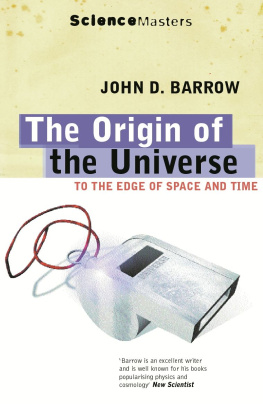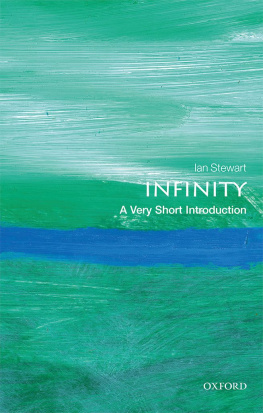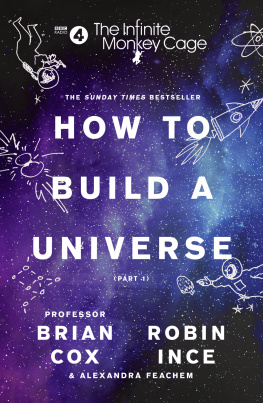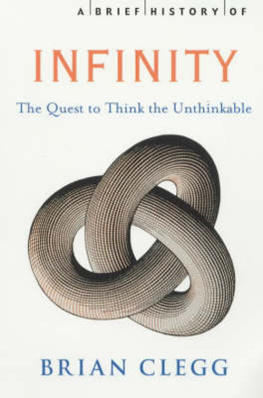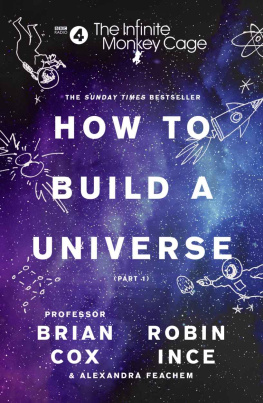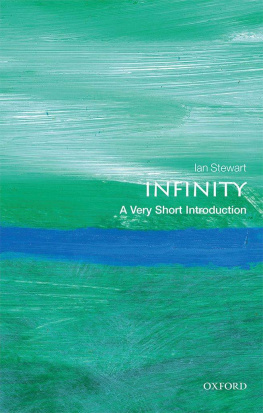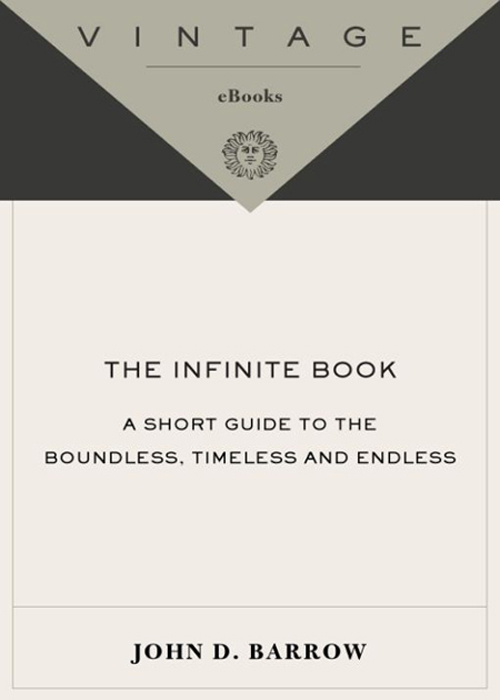
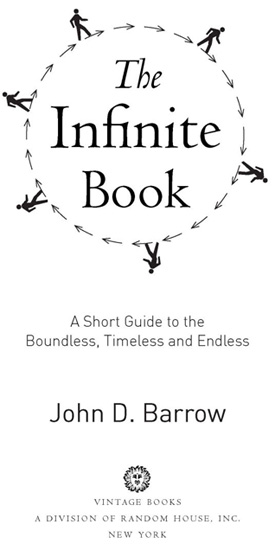
Table of Contents
To Luca Ronconi
for his boundless imagination
A lot of English writers are consigned to writing about adultery in Camden because the big themes are elsewhere
Damon Galgut
Praise for John D. Barrows
THE INFINITE BOOK
Truly mind-expanding stuff. If, like Blake, you want to hold infinity in the palm of your hand, then this is for you.
The Guardian (London)
For those who like some deep thinking with their reading.... So engrossing, it became difficult to tear away from it.
Tampa Tribune
A delight. I have read all of Barrows books, and this is the one I have enjoyed the most.... [It] is definitely the most readable and the most fun.... Barrow offers a fresh view of things.... Popular science doesnt come much better than this.
The Independent (London)
Provocative.... Barrow [is] a lucid and compelling writer.
Discover
If you enjoy a good intellectual wrestle, this book is for you.... [It] makes you realise that in the wonderful and immeasurable things of life such as love, beauty and infinity, science has nothing half as interesting to say as the imagination.
Daily Mail
Preface
I am painting the infinite
Vincent van Gogh
This is a book about the biggest subject of all. Its the ultimate travellers guide to everything that could be: the rough and the smooth guide to infinity.
Infinity has haunted human minds for thousands of years. It challenges theologians and scientists alike to understand it, cut it down to size, find out if it comes in different shapes and sizes, and decide whether we want to outlaw or welcome it into our human descriptions of the Universe. Is it part of the problem or part of the solution?
It is also a live issue. Physicists accelerating quest for a Theory of Everything has been primarily guided by an attitude towards infinities. Their appearance can be a warning that you have entered a blind alley on the road to the truth. The enthusiasm with which superstring theories were embraced was a consequence of their ingenious evasion of the problem of infinities that had plagued all their predecessors.
These exciting new theories leave us to decide whether we should expect matter to be infinitely divisible. Will we always be able to find ever smaller, more elementary, particles inside any that we have, like a never-ending sequence of Russian dolls? Or is there a limit, a smallest thing, a smallest size, or a shortest time, where division comes to a full stop? Or perhaps the fundamental entities out of which the world is woven are not really little particles at all?
Cosmologists have their own problems with infinities. For decades they have been happy to live with the notion that the Universe of space and time began at a singularity, where its temperature, its density, and just about everything else, was infinite. But will the marriage of gravity and the quantum really permit actual infinities? Is their appearance a sign of success or failure? Are infinities just a signal that we have not found enough pieces of the puzzle, or are they a vital part of the solution to ultimate problems like the beginning and end of the Universe, the moments of the Big Bang and the Big Crunch?
Cosmologists have another strange infinity to contemplate: the possibility of an infinite future. Does the Universe seem to be on course to last forever? What does forever mean? Can life in any form continue forever? And, at a more human level, what would it mean socially, personally, mentally, legally, materially, and psychologically for us to live forever?
Mathematicians have also had to face up to the reality of infinity. The issue was a big one, one of the biggest that mathematicians have ever faced. Just seventy years ago, mathematics faced a civil war over the meaning of infinities, leaving many a casualty and much bitterness. Some wished to outlaw infinities from mathematics and redefine its boundaries to exclude all treatments of infinities as real things. Journals were closed down and mathematicians ostracised because of their attempts to exclude infinities from mathematics.
At the root of all the fuss was one mans work. The genius of Georg Cantor showed how to make sense of the paradoxes of infinity that Galileo had first identified three hundred years before. What is the nature of an infinite collection? How can it be that you can take things away from it and it still stays infinite? Can one infinity be bigger than another? Is there an ultimate infinity beyond which nothing bigger can be constructed or conceived, or do infinities go on forever? But Cantor didnt live long enough to see the fruits of his genius form part of the acknowledged body of mathematics. Sidelined and undermined by influential opponents of infinite mathematics, he gave up mathematics for long periods, was encouraged when his ideas were enthusiastically taken up by Catholic theologians, yet suffered from long bouts of depression and illness before dying alone in a sanatorium. One of the neglected heroes of mathematics, a talented artist, a simple genius: one of our chapters will tell his moving story.
Theologians ancient and modern have struggled to make sense of the infinities lurking within their doctrines and beliefs. Is God infinite? Must he not be bigger than other more mundane infinities, like the never-ending list of all positive numbers? What do different religions make of infinities? Are they regarded as a threat or a suggestion of something transhuman? Cantor provides a completely unexpected answer.
Ancient philosophers, beginning with Zeno, were challenged by the paradoxes of infinities on many fronts, but what about philosophers today? What sort of problems do they worry about? We will give some examples of live issues on the interface between science and philosophy that are concerned with whether it is possible to perform an infinite number of tasks in a finite time. Could a real computer perform a super-task? What would happen if it did? Of course, this simple question, in the hands of philosophers, needs some clarification: like what exactly is meant by possible, by tasks, by infinite, by number, by finite, and, by no means least, by time.
As we range more widely through modern science we encounter an array of strange problems about infinity: is the Universe finite or infinite? Will it go on forever? Is the past infinite? Can anything happen in an infinite Universe? Are there problems that would take an infinite time for any computer to solve? What are those problems like?
Most people think of infinity and boundlessness as one and the same thing. Curiously, they are not. There are finite things, like the surface of a snooker ball, that have no boundary at all. A fly could walk around it forever without encountering an edge. Curved spaces are different but what happens if they become infinitely curved? And didnt Einstein show us that outer space is curved, so what does this tell us about the Universe?
There are also unusual ways in which time can be finite yet not have an end. Usually, we think of time as a straight line stretching out in front of us. Time seems straightforward. Every event is either in the future or in the past of any other event. Alas, the Universe is not so simple. Take a straight line of soldiers marching one behind the other: each of them can say who is in front of them and who is behind. But make them march in a circle and now everyone is both in front and behind everyone else! There is no ordering any more. If time becomes circular in an analogous way, it allows time travel to occur and all manner of strange paradoxes can be conceived. You read this book carefully and travel backwards in time to tell me, word for word, all thats in it. So where did the idea for this book come from? You got it from me, but I got it from you. It seems to have been created out of nothing a bit like the Universe.
Next page


